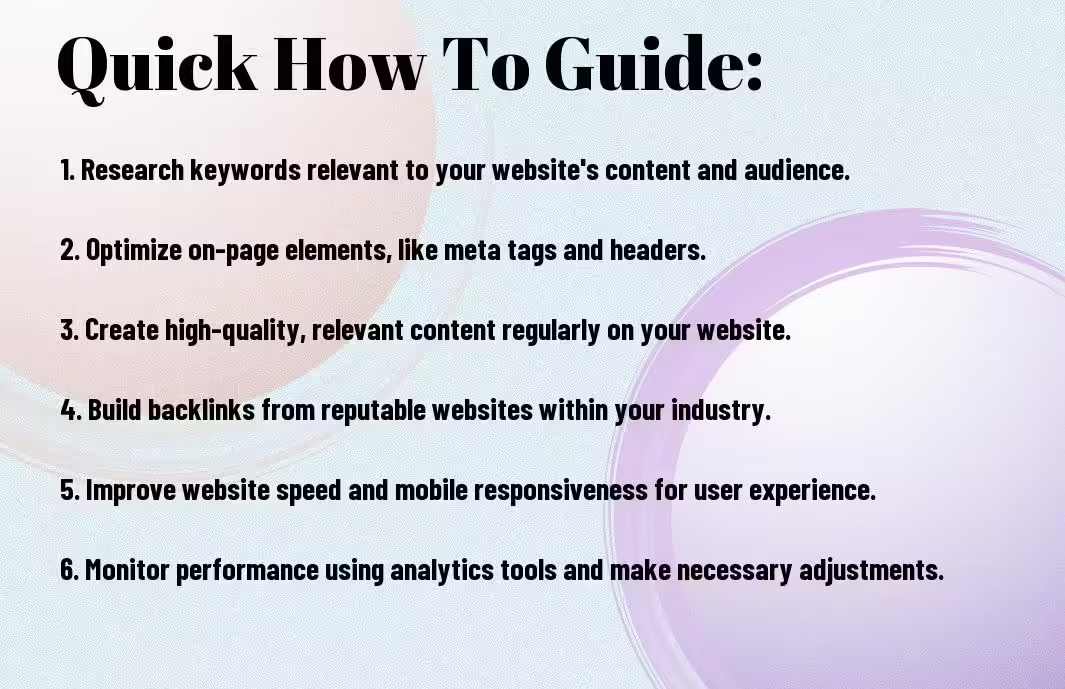You might have a great website, but if it’s not showing up in search engine results, it’s like having a billboard in the middle of the desert. Understanding SEO (Search Engine Optimization) is crucial to improving your website’s visibility and attracting more organic traffic. In this guide, you will learn practical tips and strategies to demystify and master the art of SEO, ultimately boosting your website’s presence on the web.
Key Takeaways:
- Understanding SEO Basics: It is important to have a good grasp of search engine optimization (SEO) fundamentals to improve your website’s visibility.
- Keyword Research: Conduct thorough keyword research to identify relevant keywords that your target audience is searching for.
- On-Page Optimization: Optimize your website’s content, title tags, meta descriptions, and images for search engines to improve visibility.
- Quality Content: Creating high-quality, engaging content that provides value to your audience is key for improving SEO and increasing website traffic.
- Backlink Building: Building a strong backlink profile from reputable websites can significantly boost your website’s visibility in search engine results.

Understanding SEO Fundamentals
What is SEO and Why is it Important?
The concept of Search Engine Optimization (SEO) might seem daunting, but it is simply the practice of optimizing your website to rank higher in search engine results pages. By improving your website’s visibility through SEO, you increase the chances of attracting more organic traffic and potential customers. SEO is necessary for businesses looking to establish a strong online presence and stand out in a competitive digital landscape.
How Search Engines Work
Any time you perform a search on a search engine like Google, the search engine works by crawling and indexing websites to provide the most relevant results to your query. Search engines use complex algorithms to determine the rankings of websites based on various factors such as relevance, authority, and user experience.
Engines prioritize delivering high-quality content that meets the user’s search intent. Therefore, it’s vital to create valuable and relevant content on your website that aligns with what people are searching for online.
The Role of Keywords in SEO
There’s no denying the significance of keywords in SEO. Keywords are the words and phrases that users type into search engines when looking for information. By strategically incorporating relevant keywords into your website’s content, meta tags, and headings, you improve the chances of your website appearing in search results for those queries.
To maximize the impact of keywords, you should conduct thorough keyword research to identify the terms your target audience is using. Incorporating long-tail keywords and focusing on user intent can also help optimize your website for better visibility and higher rankings in search results.

Keyword Research and Planning
How to Conduct Effective Keyword Research
Now, let’s examine the crucial process of conducting effective keyword research for your website. This step is vital to understand what terms people are searching for in your industry and to optimize your content accordingly. By targeting the right keywords, you can increase your website’s visibility and attract relevant traffic.
Identifying Relevant Keywords for Your Business
While identifying relevant keywords for your business, you need to consider the search intent behind each keyword. Think about what your potential customers are looking for when they type in these terms. Make sure to choose keywords that are directly related to your products or services to ensure relevant traffic to your site.
With a thorough understanding of your target audience and industry, you can brainstorm a list of potential keywords that align with your business objectives. Consider using keyword research tools to expand your list and identify high-volume, low-competition keywords that can give you an edge in search rankings.
Creating a Keyword Strategy for Your Website
Understanding how to create a keyword strategy for your website is crucial for driving organic traffic. Your strategy should involve selecting a mix of short-tail and long-tail keywords that cover a range of search intents. By incorporating these keywords strategically into your website’s content, meta tags, and URLs, you can improve your search engine ranking and attract more visitors.
Relevant keywords that accurately reflect your business offerings will not only help you rank higher in search results but also connect you with users who are actively looking for what you provide. Remember to periodically review and adjust your keyword strategy to adapt to changes in search trends and user behavior.
On-Page Optimization Tips
Keep in mind that on-page optimization plays a crucial role in improving your website’s visibility on search engines. These are the elements that you have direct control over, so optimizing them correctly is necessary for your SEO strategy. Here are some tips to help you enhance your on-page optimization:
- Main keywords: Incorporate your main keywords strategically into your title tags, meta descriptions, headers, and throughout your content.
- Internal linking: Link to other relevant pages on your website to improve navigation and boost SEO.
- Optimized images: Use alt text and descriptive filenames for your images to improve accessibility and SEO.
Though implementing these on-page optimization tips may seem time-consuming, the results are well worth the effort in terms of increased visibility and traffic to your website.
How to Optimize Your Website’s Title Tags and Meta Descriptions
There’s a common saying in the world of SEO that “you should treat your title tags like a book title and your meta descriptions like a book summary.” This means that these elements should accurately reflect the content of the page and entice users to click through to your website. Make sure to include your main keywords naturally in both the title tags and meta descriptions to improve your chances of ranking higher in search results.
The Importance of Header Tags and Structured Content
Tips for optimizing your website’s header tags and content structure include using header tags (H1, H2, H3, etc.) to break up your content into digestible sections and incorporating relevant keywords in your headings. This not only makes your content more organized and readable for visitors but also helps search engines understand the hierarchy and context of your content, ultimately improving your SEO.
Header tags are necessary for signaling the importance of various sections of your content to search engines. Additionally, using structured content helps search engine crawlers interpret your content more effectively, leading to better indexing and ranking.
Optimizing Your Website’s Images and Videos
There’s no denying the power of visuals in enhancing user experience on your website. However, to fully leverage the SEO benefits of images and videos, you need to optimize them properly. Start by using descriptive filenames and alt text for your images to provide context for search engine crawlers. Additionally, consider creating video transcripts and captions to make your videos more accessible and indexable.
Technical SEO Factors to Consider
All websites have technical aspects that can impact their search engine visibility. Technical SEO focuses on optimizing these elements to improve your website’s performance in search results. Here are some key factors to consider:
- Page Speed: This refers to how quickly your website loads. A slow-loading site can negatively impact user experience and your search engine rankings. To improve your page speed, you can optimize your images, leverage browser caching, and minimize server response time.
- Mobile Responsiveness: With more people using mobile devices to browse the internet, it’s crucial that your website is responsive and provides a seamless user experience on all devices. Google prioritizes mobile-friendly websites in its search results, so optimizing for mobile can boost your visibility.
How to Improve Your Website’s Page Speed and Mobile Responsiveness
An important aspect of technical SEO is optimizing your website’s page speed and mobile responsiveness. You can use tools like Google’s PageSpeed Insights to analyze your site’s performance and identify areas for improvement. Make sure to compress images, enable browser caching, and implement responsive design to enhance the user experience on mobile devices.
The Impact of SSL Certificates and Website Security on SEO
Some key technical SEO factors include SSL certificates and website security. Having an SSL certificate installed on your site ensures that data exchanged between your web server and users’ browsers is encrypted and secure. Google considers site security as a ranking signal, so implementing SSL can positively impact your SEO efforts.
Mobile responsiveness is becoming increasingly important for SEO as Google shifts towards mobile-first indexing. Ensuring that your website is optimized for mobile devices can help improve your search rankings and visibility in mobile search results.
Understanding and Optimizing Your Website’s Crawlability and Indexability
Little details like having a sitemap, optimizing your robots.txt file, and using internal linking can impact your website’s crawlability and indexability. Making it easier for search engine bots to navigate and index your site can improve your overall SEO performance.
Another tip is to regularly check your website’s crawl errors using Google Search Console. Addressing any issues that prevent search engines from properly crawling and indexing your site can help boost your visibility in search results.
Building High-Quality Backlinks
The Importance of Backlinks in SEO
If you’re looking to improve your website’s visibility and ranking on search engines like Google, building high-quality backlinks is crucial. Backlinks are necessaryly links from other websites directed towards your site. Search engines consider these backlinks as votes of confidence in the credibility and authority of your website. The more high-quality backlinks you have, the more likely your website is to rank higher in search engine results.
How to Build Backlinks through Guest Blogging and Content Partnerships
Backlinks through guest blogging and content partnerships are effective ways to enhance your website’s visibility and credibility. By collaborating with other websites in your industry and publishing high-quality content on their platforms, you can secure backlinks back to your website. This not only drives traffic from the partnering site but also signals to search engines that your website is trustworthy and valuable.
Understanding the importance of building backlinks through guest blogging and content partnerships can be the key to boosting your website’s SEO performance. By establishing relationships with other reputable websites and consistently sharing valuable content, you can create a sustainable backlink strategy that enhances your online presence.
Leveraging Social Media and Online Communities for Backlink Opportunities
Importance of leveraging social media and online communities for backlink opportunities cannot be overstated. Social media platforms and community forums are excellent places to engage with your audience, share your content, and build relationships with other website owners. By actively participating in discussions and sharing your expertise, you can attract attention to your website and earn valuable backlinks from relevant sources.
High-quality backlinks from social media and online communities can significantly impact your website’s SEO performance. Engaging with your target audience and building relationships with influencers in your industry can lead to more backlink opportunities and further enhance your website’s credibility and visibility in search engine results.
Measuring and Tracking SEO Success
Not sure how to measure the success of your SEO efforts? Don’t worry, we’ve got you covered!
How to Set Up and Track SEO Metrics in Google Analytics
There’s no better tool than Google Analytics when it comes to tracking your website’s performance. By setting up specific goals and tracking relevant metrics, you can gain valuable insights into how your SEO efforts are paying off. Make sure to integrate Google Analytics with your website and regularly check key metrics such as organic traffic, bounce rate, and conversion rate to measure the impact of your SEO strategies.
Understanding and Improving Your Website’s Search Engine Rankings
With search engine rankings being a key indicator of your website’s visibility, it’s crucial to understand how to improve them. Factors such as relevant keywords, quality content, and backlinks play a significant role in determining your rankings. For instance, optimizing your website’s content with relevant keywords and building high-quality backlinks from reputable websites can help boost your search engine rankings and drive more organic traffic to your site.
Identifying and Fixing SEO Errors and Issues
Engine errors and issues can significantly impact your website’s SEO performance. It’s crucial to regularly audit your site for issues such as broken links, duplicate content, and slow page speed, as these can negatively affect your search engine rankings. By identifying and fixing these errors, you can improve your website’s visibility and ensure that it performs well in search engine results pages.
Tracking the health of your website’s SEO is crucial for maintaining and improving its visibility online. By setting up and tracking relevant metrics in Google Analytics, understanding and improving your search engine rankings, and identifying and fixing SEO errors and issues, you can ensure that your website is optimized for maximum visibility and success.
Summing up
From above, you now have a better understanding of SEO and how you can enhance your website’s visibility. By implementing keyword research, optimizing your content and website structure, and building high-quality backlinks, you can improve your rankings on search engine results pages. Consistently monitoring and adjusting your SEO strategy will help you stay competitive and attract more organic traffic to your site.
Q: What is SEO?
A: SEO stands for Search Engine Optimization. It is the practice of optimizing your website to improve its visibility in search engine results pages.
Q: Why is SEO important for a website?
A: SEO is important because it helps your website rank higher in search engine results, driving more organic traffic and potential customers to your site.
Q: What are some key SEO strategies to improve website visibility?
A: Some key SEO strategies include keyword research and optimization, creating high-quality content, improving website speed and user experience, and building backlinks from reputable sites.
Q: How long does it take to see results from SEO efforts?
A: The time it takes to see results from SEO efforts can vary depending on various factors such as the competitiveness of your industry, the quality of your website and content, and the consistency of your SEO efforts. Generally, it can take a few months to start seeing significant results.
Q: Should I hire an SEO agency or consultant to improve my website’s visibility?
A: Hiring an SEO agency or consultant can be beneficial if you lack the time or expertise to implement SEO strategies effectively. They can provide valuable insights and help you develop a customized SEO strategy to improve your website’s visibility and rankings.







